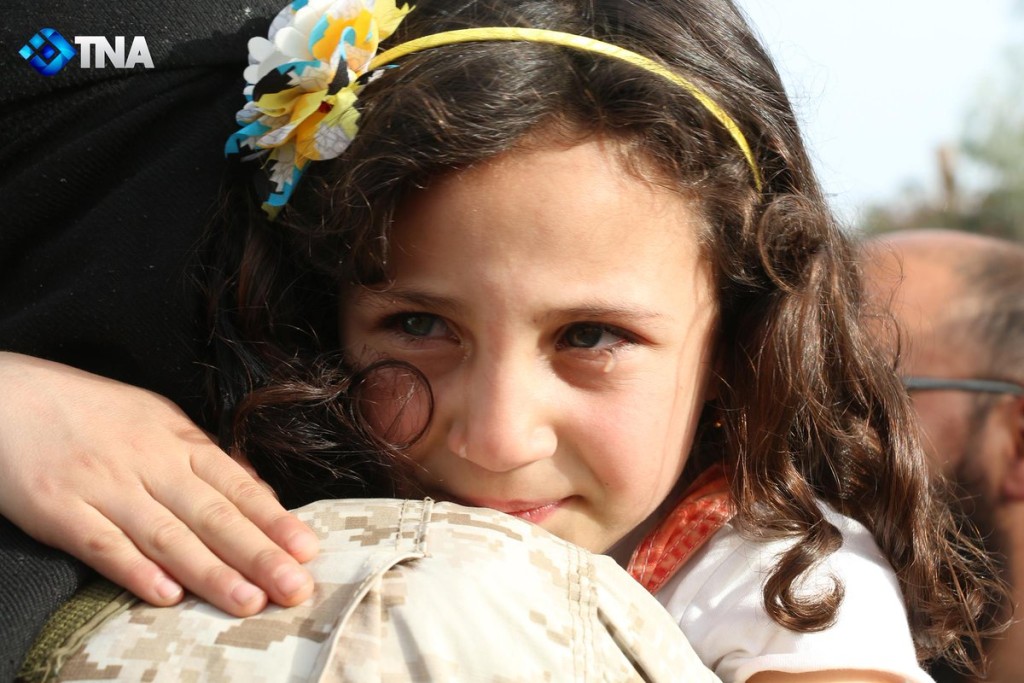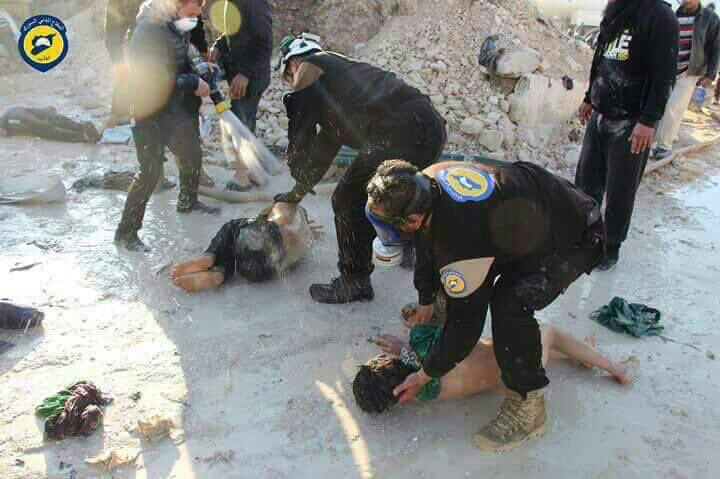Russia tries another line to discredit inquiry into April 4 chemical attack in northwest Syria
LATEST
- US Says It Killed Top ISIS Official in April 6 Raid
- Russia & Pro-Assad Forces Seek Breakthrough in Northern Hama Province
- Video: Displaced Residents of Madaya and Zabadani Speak Out
Russia has complained again about the international investigation into the Assad regime’s deadly chemical attack on a town in northwest Syria almost three weeks ago.
Since a regime warplane fired a missile with a nerve agent into Khan Sheikhoun on April 4, killing at least 93 people and wounding almost 600, Moscow has held a conflicting line on an inquiry. It has maintained that it supports an investigation, while blocking a UN resolution that mandates the Assad regime to cooperate with the Organization for the Prohibition of Chemical Weapons.
On Friday, Russian Foreign Minister Sergei Lavrov told US Secretary of State Rex Tillerson that Moscow’s issue is the exclusion of Moscow’s personnel from the investigation, according to the State Department. Lavrov said that Russia regrets US opposition to its involvement.
The State Department said the two sides agreed to consider one more time an “objective investigation into the incident” under the aegis of the OPCW. However, the statement implicitly rejected Lavrov’s demand for Russian inspectors: “The Secretary reiterated his support for the OPCW’s existing investigative mechanism.”
Because of the Russian veto in the Security Council, the OPCW has not yet investigated inside Syria. However, it has evaluated the evidence from 10 victims of the attack, from treatment or autopsies in Turkey, and concluded that “sarin or a sarin-like substance” was used.
The US and UK have gone farther and said the evidence is “conclusive” that the Assad regime carried out the attack.
Before the call with Tillerson, Lavrov went farther in his denunciations of the investigation. He claimed — in defiance of the Russian veto of the resolution — that a visit by chemical weapons inspectors to Khan Sheikhoun had been rebuffed. The Foreign Secretary maintained that the incident was being used as a pretext for Assad’s removal from power:
I think that this is a very serious situation, because it is evident now that the false information about chemical weapons use by the Syrian state is being used to avoid enacting resolution 2254 that stipulates a political settlement. Instead, there is a move towards the long-standing plan for regime change. I’m certain that we must prevent it.
During a visit to Israel, US Defense Secretary James Mattis asserted, I can say authoritatively they [the Assad regime] have retained some [chemical weapons]. It’s a violation of the United Nations Security Council resolutions, and it’s going to have to be taken up diplomatically.”
But President Assad — contradicting Russia’s attempts to explain away the chemical attack — repeated that it never occurred. He told Russian outlets, “To us, there was no chemical attack and no chemical depot. It was a fabricated play to justify the [US] attack on the Shayrat airbase.”
Three days after the assault on Khan Sheikhoun, two US warships fired 59 missiles on the Shayrat airbase in Homs Province, from where the warplane which carried out the chemical attack took off.
Russia has said from the outset that chemicals were released in Khan Sheikhoun, alternatively saying that it was a rebel “false flag” attack or that a regime warplane struck a rebel warehouse filled with chemical stocks.
Assad also rewrote recent history, erasing the Russian veto of the Security Council resolution for his regime’s cooperation with the investigation:
We formally sent a letter to the United Nations, we asked them in that letter to send a delegation in order to investigate what happened in Khan Sheikhoun. Of course till this moment they didn’t send, because the West and the United States blocked any delegation from coming, because if they come, they will find that all their narratives about what happened in Khan Sheikhoun and then the [US] attack on Shairat airport was a false flag, was a lie.
TOP PHOTO: Rescuers treat victims of the nerve agent attack on Khan Sheikhoun in northwest Syria, April 4, 2017
US Says It Killed Top ISIS Official in April 6 Raid
The US military says atop Islamic State official has been killed by its special operations forces in a ground raid in eastern Syria.
Abdurakhmon Uzbeki, “a close associate” of ISIS leader Abu Bakr al-Baghdadi and an alleged plotter of a deadly attack on an Istanbul nightclub, was killed on April 6 in Mayadin in Deir ez-Zor Province, said US Central Command spokesman Col. John Thomas.
“He facilitated the movement of foreign terror fighters and funds,” Colonel Thomas said in a Friday briefing from CENTCOM headquarters in Florida.
Soon after the attack in Istanbul, in which 39 people died, Turkish authorities arrested the suspected gunman. Abdulgadir Masharipov, an Uzbek citizen, later confessed to the shooting.
The operation was conducted by the expeditionary targeting force, a group of commandos from the Joint Special Operations Command.
The State Department’s envoy in the campaign against ISIS celebrates:
Confirmed: death of senior #ISIS terrorist & #Baghdadi associate via US military operation near Mayadin, #Syria. We will reach u anywhere. pic.twitter.com/Y1MYBwx67o
— Brett McGurk (@brett_mcgurk) April 21, 2017
Russia & Pro-Assad Forces Seek Breakthrough in Northern Hama Province
Russia and pro-Assad forces are seeking a breakthrough in northern Hama Province, advancing on the town of Halfaya.
As Russia carries out intensive bombing, the ground assault is from the south and from the east, after Iranian-led foreign militia and regime units took the town of Taibat al-Imam this week.
Halfaya has swapped hands several times during Syria’s 73-month conflict. It has been controlled by rebels since August 2016.
Russia is also continuing its sustained bombing, including incendiary and thermobaric munitions, of the town of Latamneh:
N. #Hama: #RuAF launching wave after wave of thermobaric bombs on Al-Lataminah. pic.twitter.com/LiFRE7QjRH
— Qalaat Al Mudiq (@QalaatAlMudiq) April 22, 2017
A rebel offensive had taken about 25 towns and villages in northern Hama last month, reaching as close as 5 km (3 miles) from Hama city, before the Russia-enabled counter-attacks regained almost all of the territory.
A child cries amid the destruction in Latamneh:
N. #Hama: civilian casualties, among them children (their father killed), after airstrikes destroyed their hideout in Al-Lataminah. pic.twitter.com/jZBNGRUY9i
— Qalaat Al Mudiq (@QalaatAlMudiq) April 22, 2017
Video: Displaced Residents of Madaya and Zabadani Speak Out
On the Ground News interviews residents removed from the besieged opposition towns of Madaya and Zabadani, northwest of Damascus, to northwest Syria:
About 2,000 rebels and residents are being taken from the area, surrounded since July 2015, in return for the movement of about 10,000 fighters and residents from the regime enclaves of al-Fu’ah and Kafraya in Idlib Province.
A pro-opposition site also said 750 detainees were released from regime prisons on Friday. The terms of the deal call for a total of 1,500 political prisoners to be freed.
A woman says, “I’ve seen my son, my sister, and our children, and we are all happy. But this isn’t our land.”
A young girl cries as the final group leaves Madaya and Zabadani:


